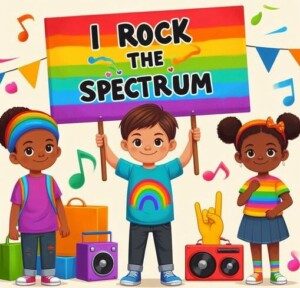April is Autism Acceptance Month, but every day of the year is a good time to appreciate what the autistic mind can bring to humanity.
Autism, a spectrum condition, manifests in so very many ways.
However, despite its prevalence, misconceptions about autism persist, often overshadowing the diverse experiences of autistic individuals.
As April is here, heralding Autism Acceptance Month, it’s imperative to become more acquainted with the contributions of autistic individuals.
ASD is not a monolithic entity, but rather, a spectrum encompassing a broad range of traits, abilities and challenges.
From those who require extensive support to individuals with exceptional talents or who run their own companies, autism spectrum presents uniquely in each person.
For example, the quietest person in a room full of people could be autistic, while the loudest and most talkative person could also be autistic! Cool, right?
Neurological differences, including autism, should be recognized and respected as natural variations within the human population.

©Lorra Garrick
Stop the Stereotyping
One prevalent misconception that plagues the perception of autism is the tendency to stereotype and generalize.
Autistic people are often unfairly depicted through narrow and inaccurate portrayals, giving rise to harmful stereotypes.
The image of the savant, exemplified by the character of Raymond Babbitt in the film “Rain Man,” is but one archetype that fails to capture the full spectrum of autistic experiences.
While some Autistics may possess extraordinary abilities in specific areas, such as math or music, such talents are not indicative of all autistic individuals, nor should they define their worth.
Moreover, the notion that autism is a “processing error” or a deficiency in cognition is erroneous and stigmatizing.
Autism is better understood as a different cognitive operating system, characterized by distinctive patterns of thinking, perceiving and interacting with the world.
While these differences may present glitches in certain contexts, they also offer unique strengths that enrich society.
By reframing autism as a variation rather than a deficit, we can shift towards a more accepting and affirming paradigm that celebrates the diversity of human experience.
We need to snuff out the myths and misconceptions that perpetuate stigma and discrimination.
Contrary to popular belief, autism is not a mental illness, but rather, a neurodevelopmental condition that originates early in life.
It’s not caused by bad parenting or vaccines, as erroneously propagated by pseudoscientific theories.
Instead, research suggests a complex interplay of genetic and neurological factors in the etiology of autism.
Autistics Face Challenges in a World Built for Neurotypicals

©Lorra Garrick
Furthermore, it’s essential to acknowledge the challenges faced by autistic individuals in navigating a world often ill-suited to their needs.
Imagine how well Autists would fit in on Planet Vulcan! (“Star Trek” fans will understand this.)
Sensory sensitivities, difficulties with social communication, and burnout from socializing among neurotypicals are among the myriad of experiences that Autistics may encounter.
These can impact various aspects of daily life, from forming friendships to pursuing education and employment opportunities.
But hold on — that last line you just read doesn’t mean that every Autistic struggles with navigating academics and staying on top of their schoolwork, or that there’s no such thing as an autistic person who has neurotypical friends.
You must not lose sight of the concept of spectrum.
So in my case, for example, I never needed assistance navigating the school systems including college life at a dormitory.
But I found it impossible to work comfortably at a job after college where there was a continuous hiss-humming coming from a nearby room of big “ancient” computers.
I was the only employee of many who had to wear noise cancelling headphones.
Recognizing barriers is the first step towards creating a more inclusive and accommodating environment that respects the rights and dignity of autistic individuals.
Too often, traditional educational and workplace environments are not designed to accommodate the diverse needs and learning styles of autistic men and women, leading to feelings of or actual exclusion.
A step in the right direction would be that of more and more companies joining in on implementing accommodations for autistic workers.
Examples might be dimmer lighting, quietness, advance notice of major changes and flexible work arrangements.
Some autistic employees may not even need any of the above accommodations, but may need modifications for less common struggles such as not being required to work near someone who’s wearing perfume or cologne.
Educating the public about autism, promoting acceptance and understanding, and encouraging inclusion are essential steps in combatting stigma.
Autism Comes with Strengths

©Lorra Garrick
Additionally, people need to recognize and celebrate the unique strengths and talents that autistic individuals bring to society.
While some may excel in areas such as science, technology, engineering and math (STEM), others may demonstrate creativity, empathy and a unique perspective on the world.
We Autists tend to think outside the box, notice details that typical people miss, detect patterns and have an eye for deviation.
By creating opportunities for autistic individuals to showcase their talents and contributions, we can dismantle stereotypes and demonstrate the value of neurodiversity.
The Takeaway

©Lorra Garrick
Autism Acceptance Month serves as a reminder of the importance of embracing diversity, picking a fight with stereotypes and creating inclusive communities that celebrate the contributions of those on the Spectrum.
 Lorra Garrick has been covering medical and fitness topics for many years, having written thousands of articles for print magazines and websites, including as a ghostwriter. She’s also a former ACE-certified personal trainer. In 2022 she received a diagnosis of Level 1 Autism Spectrum Disorder.
Lorra Garrick has been covering medical and fitness topics for many years, having written thousands of articles for print magazines and websites, including as a ghostwriter. She’s also a former ACE-certified personal trainer. In 2022 she received a diagnosis of Level 1 Autism Spectrum Disorder.
.










































